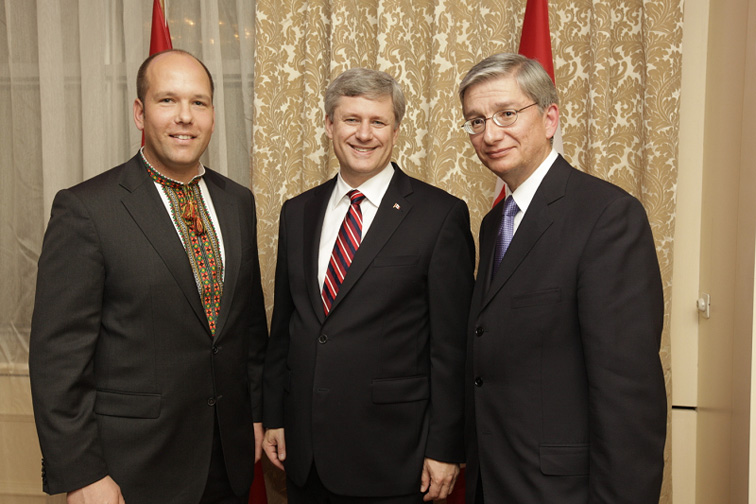Prime Minister Harper’s
Visit to Ukraine
Sending Harper to Ukraine Sends Message of Concern
By David Marples
Prime Minister Stephen Harper’s visit to Ukraine [October 25-26]
has offered some clear signals that Canada is concerned about recent
developments in Ukrainian politics, particularly violations of human rights, a
pro-Russian orientation, and the growing accumulation of power in the hands of
President Viktor Yanukovych.
In taking such a clear stance, Harper’s position
departs from that of countries of the European Union, which appear to be
concerned primarily about regional stability and favour warmer relations with Russia. The EU’s motivation,
ostensibly, is the need for reliable imports of Russian gas and oil, which were
disrupted frequently during the administration of Yanukovych’s predecessor,
Viktor Yushchenko.
The Canadian Prime Minister seemed more at ease
during his visit to L’viv on the second day of his tour than during official
meetings in Kyiv. At the latter, he was addressed in Russian by Ukrainian Prime
Minister Mykola Azarov. During an emotional visit to the memorial to the
Famine-Holodomor of 1932-33, Harper referred to the horrors of that event
without using the word genocide. Yanukovych, perhaps relieved, acknowledged the
enormity of the famine, but referred to it as a crime that also affected Russia, Belarus, and Kazakhstan. In short, the Ukrainian
leader repeated the perspective offered regularly by the Russian leadership.
In L’viv, however, Harper could be more
forthright. In the largest city of Western Ukraine there is little
affection for the Yanukovych government. The Prime Minister made a point of
visiting those directly affected by the authorities’ clampdown, including
historian Ruslan Zabilyi, an employee of the Ukrainian Security Service (SBU),
who works at the Lonsky Prison, now SBU property, which was used both by
the Soviet NKVD and Nazi Germany during the Second World War. Harper
also met with Borys Gudziak, Rector of the Ukrainian Catholic University of
L’viv, who was also approached by the SBU last May and warned that
students taking part in protests against the government would be prosecuted. In
his talk at the university, Harper did describe the Famine of 1932-33 as
genocide.
Yanukovych claims to be open to [democratic]
reforms and supportive of Euro-Atlantic structures, but has rejected NATO
membership and accepted a proposed renovation of the Russian Black Sea Fleet.
Moreover, the attitude of some of his team - most
notably Azarov and Education Minister Dmytro Tabachnyk - is closer to a Soviet
than a democratic mentality. The irascible Tabachnyk in particular does not
consider the western regions part of Ukraine and denies that the
famine was genocide.
Thus it is to be hoped that Ukraine heard Canada’s message loud and
clear. It was one of concern for a formerly close friend that seems to have
taken some very wrong steps indeed.
Excerpts taken from The Edmonton Journal, October 27, 2010
The Message to Mr.
Yanukovych
Winnipeg Free Press, Editorial, October 27, 2010
Ukrainian President Viktor Yanukovych Monday
[October 25] declined to join Canadian Prime Minister Stephen Harper when
Harper used the occasion of his visit to Ukraine to
talk about the Ukrainian Famine - the Holodomor, as it is called. The Holodomor
was one of the greatest genocides of the 20th century. As many as 10 million
Ukrainians died of starvation and disease as the result of the calculated
policy of Soviet dictator Josef Stalin. Many Western leftists continue to deny
this genocide took place and many Russians remain unapologetic in their defence
of Stalin’s monstrous tyranny. Mr. Yanukovych stands proudly among them. As an
unreconstructed Soviet-style Communist, he maintains the famine was a natural
event affecting the entire Soviet Union,
rather than the result of Stalin’s deliberate decision to destroy the Ukrainian
nation.
After Ukraine
declared its independence from Russia [The
Soviet Union] in 1991, Canada was
the first nation to recognize the declaration. Canada also
was one of the first nations to recognize the Ukrainian Famine as an act of
genocide, a fact of which all Canadians rightly should be proud. Mr. Yanukovych
is not nearly as forthright as Mr. Harper, which perhaps was why he did not
choose to share the stage with him. The famine, he said later, was a “horrible
event in the history of the Ukrainian people and in the history of our
neighbouring peoples,” echoing the Stalinist line the famine was a natural
phenomenon rather than an act of government policy.
The Ukrainian Famine needs to
be remembered as one of the worst acts of genocide in the 20th century, a
century that was scarred by genocides. Mr. Harper made that point this week. He
and Mr. Yanukovych did agree to facilitate the movement of young Canadians and
Ukrainians between the two countries.
Mr. Harper, however, also
reminded Canadians and Ukrainians -- after Ukraine and Russia, Canada is
home to the largest Ukrainian population in the world -- of a more immediate
threat.
That is the fact that after
almost 20 years of independence, Ukraine’s
democracy remains fragile and Mr. Yanukovych’s government does nothing to make
it more sturdy.
Canada and Ukraine have
mutual interests in trade and cultural relations that can benefit both nations,
but those interests can only prosper between two democracies, as Mr. Harper has
now.
PHOTO
L. to R.: Paul Grod, National President, Ukrainian Canadian
Congress, Prime Minister of Canada, The Rt. Hon. Stephen Harper, Eugene Czolij,
President, Ukrainian World Congress

